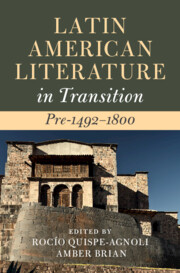Book contents
- Latin American Literature in Transition Pre-1492–1800
- Latin American Literature in Transition
- Latin American Literature in Transition Pre-1492–1800
- Copyright page
- Dedication
- Contents
- Figures
- Contributors
- Acknowledgments
- Introduction Dwelling in Transitions
- Part I Land, Space, Territory
- Part II Body
- Part III Belief Systems
- Chapter 9 The Flood Story in the Huarochirí Manuscript and Other Early Colonial Andean Texts
- Chapter 10 Idol or Martyr: Sacredness and Symbol in the Religiosity of the Indies
- Chapter 11 Creole Religiosity in Colonial Mexico: Devotional Cultures in Transition
- Chapter 12 The Empire Beyond Spanish America: Spanish Augustinians in the Pacific World, 1680–1724
- Chapter 13 Indigenous Peoples and Catholicism in Eighteenth-Century Mexico City
- Part IV Literacies
- Part V Languages
- Part VI Identities
- Index
- References
Chapter 10 - Idol or Martyr: Sacredness and Symbol in the Religiosity of the Indies
from Part III - Belief Systems
Published online by Cambridge University Press: 25 November 2022
- Latin American Literature in Transition Pre-1492–1800
- Latin American Literature in Transition
- Latin American Literature in Transition Pre-1492–1800
- Copyright page
- Dedication
- Contents
- Figures
- Contributors
- Acknowledgments
- Introduction Dwelling in Transitions
- Part I Land, Space, Territory
- Part II Body
- Part III Belief Systems
- Chapter 9 The Flood Story in the Huarochirí Manuscript and Other Early Colonial Andean Texts
- Chapter 10 Idol or Martyr: Sacredness and Symbol in the Religiosity of the Indies
- Chapter 11 Creole Religiosity in Colonial Mexico: Devotional Cultures in Transition
- Chapter 12 The Empire Beyond Spanish America: Spanish Augustinians in the Pacific World, 1680–1724
- Chapter 13 Indigenous Peoples and Catholicism in Eighteenth-Century Mexico City
- Part IV Literacies
- Part V Languages
- Part VI Identities
- Index
- References
Summary
This chapter explores transformations in the embodiment of the sacred and the profane through the study of a series of objects that emerged from belief systems of the Native peoples, such as cemis, or Europeans, such as chalices, and which were then resignified during colonial encounters. Surveying a wide range of historical and geographical contexts, including the early stages of European colonization of the islands of the Caribbean and later attempts at the colonization of what is now the US Southwest, this essay explores how the resignification of objects, which transition from sacred to profane depending on the cultural context they inhabit, points to an ongoing questioning of the hierarchical nature of spiritual and religious discourses.
Keywords
- Type
- Chapter
- Information
- Latin American Literature in Transition Pre-1492–1800 , pp. 151 - 165Publisher: Cambridge University PressPrint publication year: 2022

